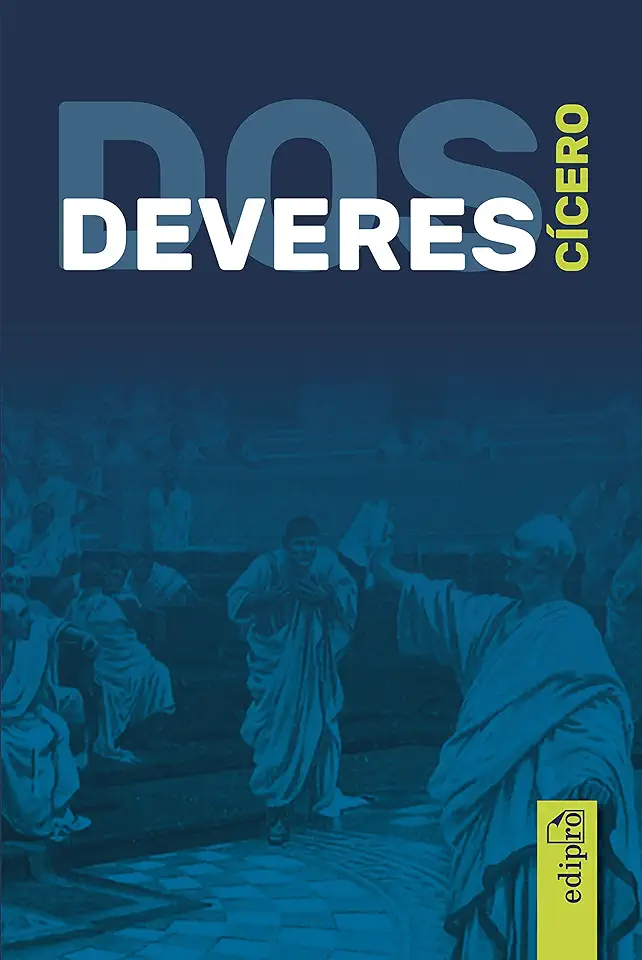
On Duties - Book I - Cicero
On Duties: Book I by Cicero
In his seminal work, "On Duties," the renowned Roman philosopher and statesman, Cicero, embarks on a profound exploration of the moral principles that guide human conduct and shape our obligations to ourselves, our fellow citizens, and the world at large. Book I of this philosophical masterpiece delves into the nature of duty, the foundations of moral reasoning, and the virtues that define a virtuous life.
The Essence of Duty
Cicero begins by establishing the concept of duty as the cornerstone of ethical behavior. He argues that duty is not merely a matter of personal preference or social convention, but rather a universal principle rooted in the very nature of human existence. Duty, he asserts, is the driving force behind all virtuous actions and the foundation of a just and harmonious society.
The Four Cardinal Virtues
Cicero identifies four cardinal virtues that serve as the pillars of moral excellence: wisdom, courage, temperance, and justice. Wisdom, he argues, is the ability to discern right from wrong and to make sound judgments based on reason and knowledge. Courage is the strength of character to face adversity, overcome fear, and stand up for what is right. Temperance is the moderation of desires and passions, ensuring that reason prevails over impulse. Justice, the most comprehensive of the virtues, encompasses fairness, honesty, and respect for the rights of others.
The Virtuous Life
Cicero expounds on the practical application of these virtues in everyday life. He emphasizes the importance of seeking knowledge and understanding, cultivating intellectual curiosity, and engaging in philosophical inquiry. He extols the virtues of courage in the face of danger, the fortitude to endure hardship, and the moral strength to resist temptation. Temperance, he argues, is essential for maintaining self-control, avoiding excess, and finding balance in all aspects of life. Justice, the cornerstone of a harmonious society, demands fairness, impartiality, and the recognition of the inherent dignity of every individual.
The Duty to Oneself
Cicero asserts that the first and most fundamental duty is to oneself. This duty encompasses self-care, self-improvement, and the pursuit of personal excellence. He emphasizes the importance of physical and mental well-being, the cultivation of intellectual virtues, and the development of a strong moral character. Cicero argues that only by fulfilling our duty to ourselves can we truly fulfill our duties to others.
The Duty to Others
Beyond our duty to ourselves, Cicero explores our obligations to our fellow citizens and the wider community. He emphasizes the importance of justice, fairness, and respect for the rights and interests of others. He advocates for the pursuit of the common good, the promotion of social harmony, and the fulfillment of our civic responsibilities. Cicero argues that by fulfilling our duties to others, we contribute to the flourishing of society and create a more just and equitable world.
The Duty to the World
Cicero concludes Book I by considering our duty to the world at large. He posits that we have a responsibility to protect and preserve the natural environment, to promote peace and understanding among nations, and to contribute to the advancement of human civilization. He argues that by fulfilling our duty to the world, we transcend our individual selves and become part of a larger, interconnected whole.
Conclusion
"On Duties: Book I" by Cicero is a timeless philosophical masterpiece that offers profound insights into the nature of duty, the foundations of moral reasoning, and the virtues that define a virtuous life. Cicero's eloquent prose and compelling arguments make this work a must-read for anyone seeking to understand the principles that guide ethical behavior and shape a just and harmonious society.